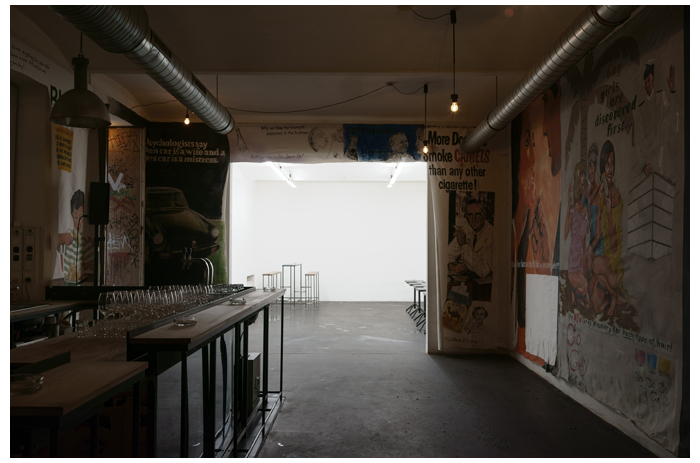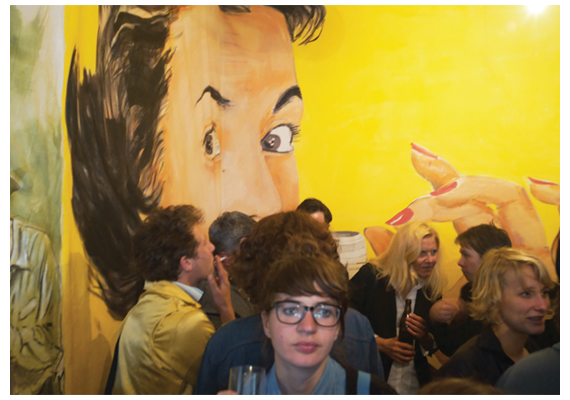


ein Interview von Ludwig Kittinger mit Hugo Canoilas:
- LK: I see, and what specifically….. What were some of
these things?
HC: Online. I’ve done a few things in the past were
I used political propaganda, which I searched online
in some archives but also with google. These advertisements
are an extension of the previous work in both
conceptual content and painting procedure – where
painting is there to be used and abused.
LK: One might find this approach quite different to
some of your other work that i find, lets just call it
poetical, with the integration of poetical/philosophical
texts/quotes, which automatically raises a question of
authorship ( reverse authorship ? ) and the question;
how many hugos are there?
HC: I don’t know. And I don’t really care about this.
I mean by the end one cannot leave his port
(Fernando Pessoa). I don’t work with a retrospect perspective,
I rather take the previous work as a platform
to jump to another place, try to develop something,
mostly try to grew with the experience of it, being
affected by the work, being a cannibal in the sense that
I aim to be another, to live many lives within one life,
to create a memory in the sense of Kierkegaard. Yes this
is a good perspective… when Kierkegaard wrote
*In vino veritas * the
perspective on love is diverse through a family of
characters he developed. Also we live in a moment
where the input is at a maximum – a whole array of
information; an unbearable multiplication of events
(social, political and artistic) that make the idea of
one perspective or line quite impossible. You know,
you open several windows at your computer, there are
far too many art events going on that makes this idea
of chaos, from which painters work from. But I don’t
want to organize that chaos…
LK: TR Young shaped the term “ fractal facticity “;
more than one thing can be true simultaneously
depending on the perspective in relation to time and
space……..don’t you think, even though it’s surely not
your/ones obligation, that decoding chaos is a help for
an analysis of culture?
HC: It might help or facilitate, help to have some
degree of visibility like a stone in a swamp where you
can rest, sit, get a higher position and gain a perspective.
But culture is that elastic structure that can hold
the difference, that enlarges specially with the attempts
to destroy it. So should we care about decoding,
being self-reflexive or even tautological in our
work? Of course there people who are dealing with
the reflexive and the rational, others with the affirmative
and the subjective, and in between there’s a whole
range of people doing work that aiming or not (being
part of a mainstream or producing counter culture)
might become assimilated by culture. It doesn’t
depend on us.
LK: Whatever success may mean to one, from a global
perspective we live in times where the capitalist state
(general public) is in demise and private power
concentration at its peak, many are trying to find alternatives
to make a living, what would you say anarchy has
got to offer?
HC: Anarchy has nothing to offer because of the
education level of people is very precarious. When I
mean education I mean a sort of whole education,
what is called the holistic formation of the self.
So without a formation of the being into an independent
state, anarchy will have nothing to offer and art will
have nothing to offer (for the whole).
LK: How would you describe the development of
your work, a single piece lets say? It originates from a
good idea? a bad idea? a notion?
HC: I can’t describe a normal procedure since for me
to make my work doesn’t come from a precise state of
mind or a formula. It’s more something that happens
and this could be forcing it by working and failing or
just get a click. Usually the click – the good idea,
functions more like a platform to jump to the unknown.
I like to work without any good ideas in my
mind, or a precise goal. I like to work without a sort
of need that I could talk about. I’m really interested in
digging my stomach, trying to deal with that something
that is making me work – an interior and
primordial impulse.
Solo exhibitions
2013
Spirit of the air, Wiener Art foundation, hosted by Kunstuero, Vienna, AT.
Magma, Workplace Gallery, Newcastle. U.K.
2012
Paradise Birds – 30th São Paulo Biennial – A iminência das poéticas, curated by Luiz Perez Oramas, Tobi Maier,
André Severo and Isabela Villanueva ; Museum Casa do Bandeirante; São Paulo. BR. (catalogue)
Hugo Canoilas, ABC Berlin, Galeria Collicaliggregi , IT. Berlin, DE.
The isle of the dead, Quadrado Azul Gallery, Porto. PT.
Spoken words and white walls, Quadrado Azul Gallery, Lisbon, PT.
Group shows
2012
Are you still awake?, curated by Emília Tavares. MNAC – Chiado Museum, Lisbon. PT.
Drawing quote, curated by Nick Oberthaler. Pigna Project Space, Rome. IT.
Porta Nigra, curated by Mark Kremer . Gallery Hidde van Seggelen, London, UK (catalogue)
Critical Alliances, organized by Marcus Proschek, Ekaterina Shapiro and Wolfgang Obermaier. HDLU – Croatian Artists Association, Zagreb.
Strata, curated by Francesco Sttochi, Sammlung Lenikus, Vienna. AT.
Infinit tasks, curated by Paulo Pires do Vale, Calouste Gulbenkian Museum, Lisbon. PT (catalogue)
Beyond History. curated by Nuno Faria at José de Guimarães International Art Center, Guimarães. PT. (catalogue)
CCC _ Collecting Collections and Concepts , curated by Paulo Mendes, European Capital of Culture, ASA Factory, Guimarães, PT. (catalogue)